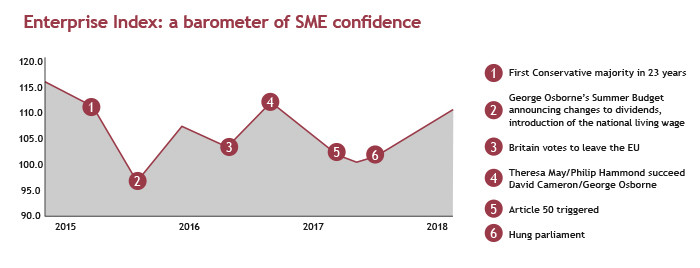Show of confidence: Three in five businesses say prospects will improve
Three in five (59%) businesses believe their prospects will improve in the next year, according to new data from Smith & Williamson’s inaugural report: Dream bigger: The scale-up moment.

- One in three (33%) businesses will borrow more money in the coming year to fund growth plans
- Confidence in the capital: London businesses are more optimistic about future growth and access to funding than other UK regions

Three in five (59%) businesses believe their prospects will improve in the next year, according to new data from Smith & Williamson’s inaugural report: Dream bigger: The scale-up moment. In a show of confidence from the UK’s business community, a quarter (26%) go as far to say that their position will improve ‘significantly’ over the coming 12 months.
The study also indicated that business leaders are growing tired of delaying expansion plans as they wait for the outcome of Brexit. One in three (33%) say they will increase their level of borrowing in the next 12 months to fund growth plans, with nearly one in five (17%) saying they would borrow ‘much more’.
The research also suggests that banks and investors could be loosening their purse strings. More than one in three (38%) companies in the sample believe that access to finance has improved in the last year – almost four times the 11% of firms which feel it has worsened.
Enterprise Index
Businesses are slightly less optimistic about the economy than about their own future, with 57% forecasting economic growth in the next year, although this is still almost double the 30% which felt the same way in Q4 2017, reported in Smith & Williamson’s Enterprise Index.
The Smith & Williamson Enterprise Index has been charting the confidence of business leaders for over five years, starting from a baseline of 100 in 2013. This research has been expanded to form the basis of the new Dream bigger report to assess the confidence levels of the UK business community.
The latest Enterprise Index rose from 103.5 at the end of 2017 to 110.5, a high not seen since the end of 2016. Unexpectedly strong performance by the UK economy in the face of Brexit negativity has contributed to this rise in confidence. In addition, the UK is benefitting from a growing global economy, a slightly more stable political environment and a tax system which has not had to face continuous overhauls following Philip Hammond’s decision to have only one showpiece Budget each year.
Businesses in London more optimistic about the future
Sentiment did vary regionally, with London-based companies far more bullish about their future. Three quarters (75%) of businesses in the capital see their prospects improving in the next year, with more than half (53%) planning to increase their borrowing. However, in the West Midlands, this drops to 59% and 12% respectively, highlighting the difference between London and regional economies.
While three in five (63%) businesses based in London believe the funding environment has improved, other regions are less positive. For example, in the South-East and South-West only 20% believe that access to funding has eased.
Guy Rigby, head of entrepreneurial services at Smith & Williamson, said: “The UK continues to have a fertile business environment which is being helped by a buoyant world economy. Interest rates remain low, employment is strong, inflation is falling and the cumulative effect of these is contributing to the confidence of our entrepreneurs.
“While the entirety of the UK is a great place to start and grow a business but there are concerns that regional development is falling behind. London has everything that growing businesses need and this creates a clustering effect: businesses of a similar size and type gather together, creating a powerful ecosystem – developing knowledge, generating jobs, increasing access to finance and, as time progresses, a snowball effect occurs.
“As a nation, we need to find ways of encouraging this type of business clustering outside London. While progress has been made in some areas, such as the process industry cluster in the North-West, biotech in Cambridge and Bristol’s tech cluster, it takes time to build momentum. It’s possible that faster progress could be achieved by a relaxation of local planning policies and the judicious use of business rates relief by Councils.”
DISCLAIMER
By necessity, this briefing can only provide a short overview and it is essential to seek professional advice before applying the contents of this article. This briefing does not constitute advice nor a recommendation relating to the acquisition or disposal of investments. No responsibility can be taken for any loss arising from action taken or refrained from on the basis of this publication. Details correct at time of writing.
Disclaimer
This article was previously published on Smith & Williamson prior to the launch of Evelyn Partners.




